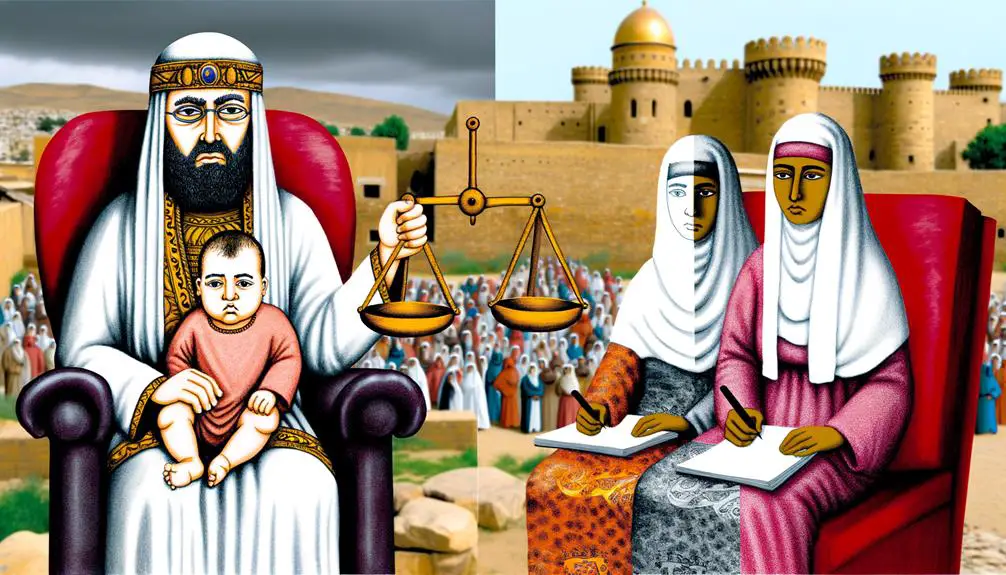Marvel at the Bible's intricate depictions of shrewdness, from Solomon's reign to cunning parables, revealing wisdom's complex shades.

Shrewdness in the Bible
Just as Solomon's wisdom was renowned throughout the ancient world, you'll find that shrewdness is a recurring theme woven through the tapestry of biblical narratives.
From Solomon's governance to the parable of the shrewd manager, the Bible doesn't shy away from portraying the complexity of human cunning.
You'll see characters like Joseph, who navigated Egyptian politics with astute strategy, and proverbs that celebrate prudence over naivety.
This exploration might challenge your preconceptions about wisdom and shrewdness, inviting you to reconsider their roles in a life of faith.
What might these stories reveal about the nuanced nature of wisdom?
Key Takeaways
- Shrewdness in the Bible is presented as a form of wisdom essential for achieving goals while adhering to moral principles.
- Biblical narratives, such as Solomon's reign and the parable of the shrewd manager, illustrate shrewdness as a virtue when coupled with righteousness.
- Proverbs emphasizes shrewdness as integral to prosperity, advocating for its use in tandem with practical wisdom and moral discernment.
- Ethical shrewdness rejects deceit and manipulation, focusing instead on balancing individual and communal well-being with justice and ethical conduct.
Defining Biblical Shrewdness

In biblical contexts, shrewdness is often depicted as a form of wisdom that involves astute, strategic thinking aimed at achieving specific goals. The concept's origins are deeply rooted in ancient texts, where it's presented not just as cleverness, but as an intellectual virtue, essential for survival and prosperity. This notion of shrewdness is nuanced, encompassing both positive and negative connotations depending on the context and the intention behind the actions.
Delving into the moral implications of shrewdness, it's clear that the Bible doesn't uniformly condemn or praise this trait. Rather, it distinguishes between shrewdness used for self-serving purposes and that which is employed towards virtuous ends. The distinction lies in the alignment of one's shrewd actions with moral and ethical principles. When shrewdness is exercised to manipulate or deceive for personal gain, it's viewed unfavorably. However, when it's applied to navigate complex situations wisely or to protect the well-being of others, it's considered commendable.
The biblical portrayal of shrewdness, therefore, serves as a guide for discerning its application in daily life. It encourages you to reflect on your motivations and the consequences of your actions, advocating for a balance between cleverness and righteousness. This dual perspective on shrewdness underscores the importance of intentionality and moral integrity, inviting you to cultivate a form of shrewdness that harmonizes with ethical standards and promotes the common good.
Solomon's Wise Governance

Reflecting on the nuanced biblical understanding of shrewdness, it's crucial to examine how Solomon's wise governance epitomizes the application of this virtue in leading a nation. Solomon's reign, as depicted in the Hebrew Bible, showcases a blend of political astuteness, strategic alliances, and monumental projects that underline his shrewdness in governance.
Central to Solomon's administration was his strategic use of alliances. By marrying daughters of surrounding nations' rulers, he not only ensured peace but also secured trade routes and resources. This network of alliances bolstered Israel's economy and positioned it as a formidable power in the region. Solomon's shrewd negotiation skills are evident in his dealings with King Hiram of Tyre, which secured the materials and craftsmen necessary for his ambitious construction projects.
The pinnacle of Solomon's architectural achievements was the construction of the Temple in Jerusalem. This endeavor not only fulfilled his father David's wishes but also served as a tangible symbol of the nation's prosperity and divine favor. The Temple's construction demonstrated Solomon's ability to mobilize resources, manage large-scale projects, and enhance Israel's religious and cultural prestige.
Solomon's governance, characterized by wise diplomatic maneuvers and monumental building projects, underscores the shrewdness in his leadership. His ability to navigate complex political landscapes and his commitment to national prosperity and religious devotion highlight the multifaceted application of shrewdness in biblical narratives. Solomon's legacy, therefore, offers invaluable insights into the wise stewardship of power and resources in governance.
Parable of the Shrewd Manager

Delving into the Parable of the Shrewd Manager, we encounter a thought-provoking illustration of astute financial stewardship within the biblical narrative. This parable, found in the Gospel of Luke, presents a manager who, upon facing the loss of his position for his mishandling of his master's assets, cleverly reduces the debts of his master's debtors to secure their favor for his own future. The master commends the manager for his shrewdness, a commendation that has sparked extensive debate regarding its ethical implications and cultural perceptions.
Analyzing the parable, it's crucial to recognize the complex interplay between commendation for shrewdness and the seemingly unethical actions of the manager. The parable doesn't straightforwardly endorse his actions but rather highlights the manager's resourcefulness in navigating a precarious situation. This complexity invites readers to engage with the parable's deeper layers, examining the tension between worldly wisdom and ethical conduct.
Furthermore, cultural perceptions of shrewdness and management practices at the time of the parable's composition play a significant role in its interpretation. In ancient Near Eastern cultures, resourcefulness and the ability to adapt to changing circumstances were highly valued. Thus, the manager's actions can be seen as a reflection of these cultural values, challenging modern readers to consider the relative nature of ethical judgments.
Joseph's Strategic Acumen

ARTICLE TITLE: Shrewdness in the Bible
PREVIOUS SUBTOPIC: 'Parable of the Shrewd Manager'
CURRENT SUBTOPIC: 'Joseph's Strategic Acumen'
Joseph's strategic acumen, particularly in his management of Egypt's grain reserves, showcases a profound understanding of both resource allocation and foresight during a period of impending famine. His journey from being sold into slavery to becoming the Pharaoh's most trusted advisor is a testament to his exceptional ability in dream interpretation and famine preparation. Joseph didn't just interpret Pharaoh's dreams as foretelling seven years of plenty followed by seven years of famine; he formulated a concrete strategy to tackle the upcoming crisis.
Strategy Component |
Impact on Egypt |
|---|---|
Dream Interpretation |
Enabled the identification of the impending seven years of famine, guiding Egypt's preparation efforts. |
Grain Storage |
Ensured ample reserves during the seven prosperous years to sustain Egypt through the famine. |
Resource Allocation |
Implemented a rationing system that prevented mass starvation and social upheaval. |
Economic Policies |
Stabilized Egypt's economy by selling grain to other regions, thus securing political and economic leverage. |
Leadership & Vision |
Cemented Joseph's status as a visionary leader who safeguarded his nation's future. |
Joseph's response to the famine crisis demonstrates his shrewdness in navigating complex situations through strategic planning and execution. His ability to foresee future challenges and prepare accordingly not only saved Egypt but also laid the groundwork for its prosperity. This strategic foresight and effective management of resources highlight Joseph's role as a quintessential figure in biblical narratives of wisdom and shrewdness.
Shrewdness in Proverbs

Having explored Joseph's strategic acumen, we now turn our attention to the wisdom literature of Proverbs, where shrewdness is frequently commended as an essential quality for personal and communal prosperity. In this biblical book, shrewdness isn't merely about being clever or cunning; it's deeply intertwined with practical wisdom and moral discernment. Proverbs presents a nuanced perspective, suggesting that shrewdness involves making astute decisions based on a keen understanding of human nature and the complexities of life.
You'll find that Proverbs doesn't celebrate shrewdness in a vacuum. Instead, it emphasizes the importance of coupling shrewdness with righteousness and fear of the Lord. This alignment ensures that one's clever strategies and insightful observations are grounded in ethical considerations and a larger moral framework. Proverbs 1:3, for instance, underscores the acquisition of disciplined and prudent living, doing what's right, just, and fair.
Moreover, Proverbs 8:12 personifies wisdom as having shrewdness and knowledge, implying that true wisdom incorporates the ability to navigate through life's challenges with discernment and understanding. This suggests that shrewdness, when combined with wisdom, leads to life choices that aren't only intelligent but also morally sound.
In essence, Proverbs advocates for a brand of shrewdness that's far removed from deceitfulness or manipulation. It champions a shrewdness that's rooted in practical wisdom, moral discernment, and a commitment to righteousness. This comprehensive approach ensures that the pursuit of individual and communal prosperity is balanced with the imperatives of justice and ethical conduct.
Frequently Asked Questions
How Does the Concept of Shrewdness in the Bible Compare to Modern Interpretations of Shrewdness in Business and Personal Ethics?
You'll find that modern interpretations of shrewdness in business and personal ethics often emphasize strategic thinking and navigating ethical dilemmas, akin to its biblical counterpart.
However, whereas the Bible may frame shrewdness within a moral or divine context, today's view leans more on practicality and effectiveness.
This shift illustrates how society has evolved in valuing cunning and foresight, blending ancient wisdom with contemporary demands for innovation and ethical decision-making.
Are There Any Negative Connotations Associated With Shrewdness in Biblical Texts, and How Do They Differ From Its Portrayal as a Positive Trait?
You'll find that shrewdness often carries negative connotations, especially when cultural perceptions lean towards viewing it as cunning or deceitful. However, through parable analysis, it's clear that shrewdness can also be portrayed positively, embodying wisdom and resourcefulness.
This duality shows a fascinating shift from biblical times to modern interpretations, where in business and personal ethics, being shrewd is frequently seen as a valuable trait, highlighting adaptability and strategic thinking.
Can Shrewdness Be Considered a Spiritual Gift or Virtue in the Context of Christian Living and Service?
You might see shrewdness as simply being savvy, but in the realm of Christian living, it's more about spiritual discernment and the wise application of knowledge.
It's a fine line between being astute for personal gain and using that acuity for greater good.
Analytically speaking, shrewdness, when aligned with spiritual discernment and applied with wisdom, can indeed be viewed as a spiritual gift or virtue, enhancing one's service and faith journey.
How Do Other Religious Texts Outside of the Bible Address the Concept of Shrewdness or Similar Traits?
When exploring how shrewdness is addressed outside the Bible, you'll find Islamic wisdom and Hindu Dharma offer unique perspectives.
Islamic texts often emphasize the importance of wisdom and strategic thinking in life's decisions, which aligns with the concept of shrewdness.
Meanwhile, Hindu Dharma values discernment and right action, which can be seen as a form of shrewdness.
Both traditions underline the virtue in using insight and intelligence for navigating life's challenges.
In What Ways Can Shrewdness Be Misinterpreted or Misused, According to Biblical Teachings, and What Are the Potential Consequences?
Imagine you're a business leader facing ethical dilemmas, tempted to cut corners for profit. Shrewdness can be misinterpreted as cunning, leading to unethical choices.
The pitfalls of misusing shrewdness include damaging trust and integrity. In scenarios like these, the consequences can range from personal guilt to public scandal.
Acting shrewdly, in the absence of ethical considerations, can backfire, highlighting the importance of balancing cleverness with moral judgment.
Conclusion
In conclusion, you've journeyed through the labyrinth of biblical shrewdness, from Solomon's sagacious rule to the astute parables and proverbs, culminating with Joseph's strategic prowess.
Like a master chess player, each figure demonstrates the power of prudence and strategic thinking in navigating life's complex board.
This exploration underscores that, within the biblical narrative, shrewdness isn't merely cunning but a revered wisdom, guiding one through the serpentine paths of morality and leadership.



Sign up